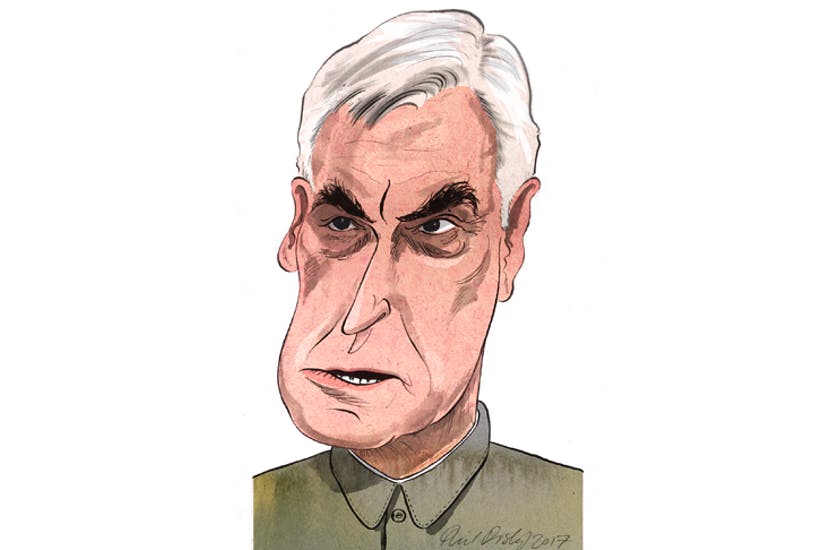One of the more interesting developments over the last year is the attempted transformation of John McDonnell from a hard-left activist who joked about “lynching” a female Conservative MP, towards a softer, more jovial, chancellor-in-waiting. It seemed to be going quite well. I appeared with McDonnell on Politics Live last year and he laughed heartily as I teased him about coveting the Labour leadership. SW1’s water-cooler chat is that McDonnell is a far more effective advocate of a Corbynite Labour position than Jeremy Corbyn himself, particularly because the Labour leader often looks so irritated at being asked relatively normal questions on television. But could that be about to change?
The sheep’s clothing did seem to be pretty well strapped to the shadow chancellor’s body – all part of his calculated strategy of being a media-friendly face for Corbynite Labour. Yes, the Westminster Bubble knew about his wolf-like views but it wasn’t clear that these were affecting his new affable public image. Might his callous and chilling comments about the predicament of Luciana Berger MP, and his clumsy critique of Winston Churchill yesterday challenge his careful construct?
Last Friday, McDonnell was interviewed on the Today Programme. The interview began with questions on Brexit, as the shadow chancellor chuckled away, joking happily with the presenter. Labour spinners must have been pleased. Good approachable image: tick. Sort of guy with whom you would like to grab a pint: tick tick. Potential successor to Corbyn (given the hit the Labour leader’s popularity has taken recently): tick tick tick. But things got worse.
Towards the end of the interview, McDonnell was challenged about Labour’s ongoing anti-Semitism crisis. In particular, he was asked what his message was to the members of Luciana Berger’s constituency Labour party who were attempting to oust their MP. He began by trying to deny the problem: “It’s not a deselection” he said. “My understanding”, he continued, is that “it’s a motion of no confidence, so that’s an expression of views”. Err, right.
The shadow chancellor did accept that it was completely wrong if people were moving against Luciana Berger because she had stood up to anti-Semitism. But he then seemed to claim that he hadn’t seen suggestions online that that was the case. Really? Hasn’t everyone on Twitter seen exactly that?
After that, he said that the cause of Luciana Berger’s problems was that she had been associated in the media with a possible breakaway party. His advice to her was “just tell people you’re not supporting a breakaway party… you’re not jumping ship”. This sounded like a threat.
John Humphrys then put to the shadow chancellor that one of the proposers of the motion, in her own Labour party, had reportedly posted on Facebook that “Berger should be exposed for the disruptive Zionist she is”. McDonnell said twice that this was “completely wrong” but then added that “the issue here…is this issue about the breakaway party”. Except that it isn’t. It has since emerged that the chair of Liverpool Wavertree Labour, Dr Alex Scott-Samuel, has been a regular guest on a radio show hosted on the website of David Icke, a man who has talked of “the global conspiracy ‘Rothschild-Zionism, a secret society putting its agents in places of power’.
The problem Luciana Berger is facing seems totally obvious to anyone who has paid it a cursory glance: it’s the attacks on a Labour MP – who by the way is over eight-months pregnant – by radical elements within her own party because she is a Jew who won’t denounce Israel but will call out anti-Semitism. Rather than standing with Luciana Berger, John McDonnell demanded she proved her loyalty, so falling into the ancient calumny of implying, remarkably directly, that Jews need to prove their loyalty. I listened and shuddered.
Last night, McDonnell was asked a question by Politico’s Jack Blanchard: “Winston Churchill: hero or villain?”. He replied “Tonypandy: villain”. Of course, it’s fair to say that Churchill’s legacy is complex – many historians would agree. And Tonypandy wasn’t his finest hour. But it was certainly bold to brand as a “villain” Britain’s greatest leader, an indisputable national treasure, our wartime hero who did more than anyone else to stop this country falling to Jew-murdering fascism.
There are moments in politics of cut through when the penny drops – when the public suddenly realises something and changes their mind about a political figure. Most people don’t read Coffee House (sadly). They don’t watch the news and they don’t pay much attention to politics. Fair enough. But they do form judgements about our national leaders. Might this be a moment when their judgement of McDonnell shifts? Perhaps. It’s too soon to tell.
We all know McDonnell’s true views. We know he praised terrorists for their “bombs and bullets and sacrifice”, outrageously arguing that “the peace we have now is due to the action of the IRA”. We remember McDonnell, as recently as 2015, favourably quoting Chairman Mao, whose state-induced Great Famine killed an estimated 45 million people and whose Cultural Revolution reduced peasants literally to eating shit. We recall McDonnell citing Lenin and Trotsky as definitive influences.
McDonnell’s disdain for Churchill is no surprise to many of us, even if we might be surprised he actually said it out loud. But will the mask now begin to slip with the wider voting public?






Comments